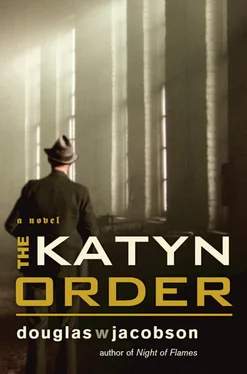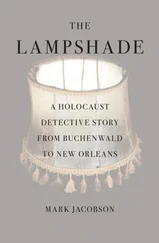The four of them sat in silence for a few moments, the visitor with his hands folded on the table in front of him, his eyes on Kovalenko. Finally, the general nodded, and Captain Andreyev, who’d brought the visitor across the river, spoke first. “You are an American and an emissary of the Polish Government-in-Exile in London?” he asked, in English.
“Yes, that is correct,” the visitor replied.
“You’ve been in Warsaw?”
“Since the beginning of the Rising.”
“And what is the situation there?”
The visitor glanced first at Kovalenko, then looked back at Captain Andreyev. “The AK have thirty thousand armed men and women in the streets of Warsaw. They have seized the City Center and Old Town, and areas of the Jolibord District in the north, as well as several sections of Mokotow in the south.”
The tank corps commander, Colonel Roskov, leaned forward and spoke tersely in Russian. Kovalenko nudged Andreyev, who then translated into English for the visitor. “Colonel Roskov asks what these men and women are armed with?”
The visitor replied, “Rifles, pistols, grenades—”
Andreyev began translating back into Russian, but Roskov broke in.
Andreyev stopped, smiled at the visitor and said, “The colonel asks if the weapons are all left over from the ’39 campaign?”
Kovalenko watched silently as the visitor spread his hands on the table and locked eyes with the tank corps commander. “Not all,” the man said firmly. “There have been airdrops from Britain, and during the first week the AK captured a substantial German weapons cache in a warehouse building—MP-38 submachine guns, anti-tank rifles—”
Roskov interrupted the translation again. Andreyev listened then said, with a hint of annoyance in his voice, “The colonel heard that the AK has assassinated several high-ranking SS officers. The Germans will make them pay for that.”
Kovalenko watched the visitor closely. Something flickered in the thin man’s eyes, but his expression remained inscrutable as he leaned forward, glaring at Roskov. “The Poles are at war, sir. We all are! Against Nazi Germany, our common enemy. Isn’t that correct?”
Captain Andreyev spoke up, obviously trying to lower the tension. “Does the AK have any artillery?”
The visitor continued to stare at the Russian tank corps commander for a moment, then turned to Andreyev. “They have mortars, some American bazookas that were air-dropped—”
“Nothing larger?” Roskov asked, this time in English.
Kovalenko knew it was an old trick of Roskov’s to throw an unsuspecting American off guard, but the visitor seemed unperturbed, as though he knew all along Roskov could speak English.
“A squad of your T-34 tanks would be very useful right now,” the visitor replied.
The group lapsed back into silence. Kovalenko waited a few moments then pulled a pack of Lucky Strike cigarettes from his shirt pocket and offered one to the visitor. “One of our politicians visited with some of your American generals last week,” he said, in his own fluent English. “He brought these back for me.”
The visitor took a cigarette, and the general lit it for him. He inhaled deeply, apparently enjoying the taste of prime tobacco. Then he folded his hands on the table and addressed Kovalenko. “When can the AK expect the Red Army to cross the Vistula and enter Warsaw, General?”
Roskov leaned across the table and snapped, “The AK has no military standing in this—”
Kovalenko cut him off with a wave of his hand. He slowly lit his own cigarette and looked at the visitor who had never even blinked during Roskov’s final attempt at intimidation. “I am waiting for final orders,” he said. “You may report to General Bor that we will be there soon.”
“How soon?” the visitor asked. “The AK are fighting like hell, but casualties are mounting. They can’t hold out forever.”
Kovalenko studied his cigarette, then abruptly shoved his chair back and stood up. Everyone around the table stood as well. “Tell them to keep on fighting,” he said to the visitor. “We will be there soon.”
31 AUGUST
ON THE LAST DAY OF AUGUST, Colonel Stag transmitted a secret message to the British Special Operations Executive.
31 August 1944
From: AK Headquarters, Warsaw
To: SOE, London
Situation in Warsaw desperate. Forty percent City Center destroyed. Air bombardments and artillery shelling constant.
Hundreds of civilians killed daily. Hospitals destroyed. Thousands homeless. Burns, shrapnel wounds and disease.
Food and water critical. If no relief, all supplies gone in ten days.
Our forces reduced by half. Continuing to fight. Weapons and ammunition critical. Airdrops unsuccessful. Old Town in severe jeopardy. Evacuation imminent.
Russian forces remain idle on east side of Vistula.
When the transmission was finished, Stag wearily climbed the stairs from the cellar of the Polonia Bank building and stood on the cobblestone street to wait for Falcon. He expected the commando to bring him a report from the AK command post at the south end of the City Center. That, of course, depended on whether Falcon could make it through the rubble-filled streets in one of the few AK vehicles still operating.
Stag was beyond fatigue. He was so tired that he twitched all over as though a million ants were crawling under his skin. He lit a cigarette and leaned back against the building as the ground shook beneath his feet. The battle had surged into Old Town and degenerated into a savage street-by-street, building-by-building bloodbath that Stag knew was hopeless. German artillery bombardments and Stuka attacks continued around the clock, and the civilians still in the area huddled in their cellars like frightened rodents. Artillery shells exploded just a few streets to the west, and Stag realized that he was risking his life just standing out in the open. But he’d been suffocating in the cellar command post, and a moment in the outside air, though polluted with smoke and dust, was a relief.
Suddenly Stag heard the all-too-familiar, high-pitched scream of a Stuka dive-bomber. It was coming from his left and closing in fast. He dropped the cigarette and started for the doorway when he saw an automobile careening toward him, bouncing along the cobblestones. He waved desperately at it, warning it off, but then a shattering blast knocked him face down onto the marble foyer just inside the doors.
Stag struggled to his feet. His ears rang and his head pounded. Blood dripped from his nose. He leaned against the wall to catch his breath as the whine of the enemy aircraft receded into the distance. He waited for a moment, then stepped slowly through the doorway and peered down the block.
A three-story building had collapsed into the street. Just beyond the rubble-pile, a black, four-door auto lay on its side, the roof caved in, the left front wheel still spinning. Stag put his hand over his mouth to keep from choking on the dust, and stepped closer. Then he stopped and leaned against a broken lamp-post for support. The body of a large man hung out the driver’s door of the wrecked auto. Half of his skull had been ripped away.
Stag didn’t have to go any closer to know that it was Falcon.
• • •
The ammunition cellar was empty now. The final crates of weapons had been hauled out since Natalia had last been there the previous night. Strangely, the kerosene lantern was still lit. With her boot, Natalia nudged the five-liter metal can next to the post. It was empty, like the rest of the cellar. Barely able to keep her eyes open, she wandered to the far wall, slumped down on the earthen floor and took a bite from a half rotten potato. It was the only thing she’d had to eat all day.
Читать дальше












